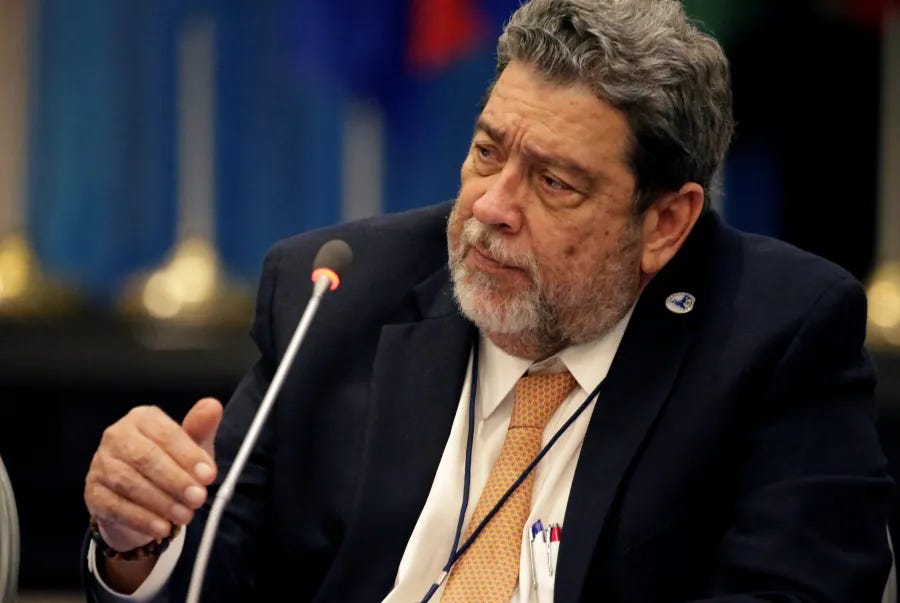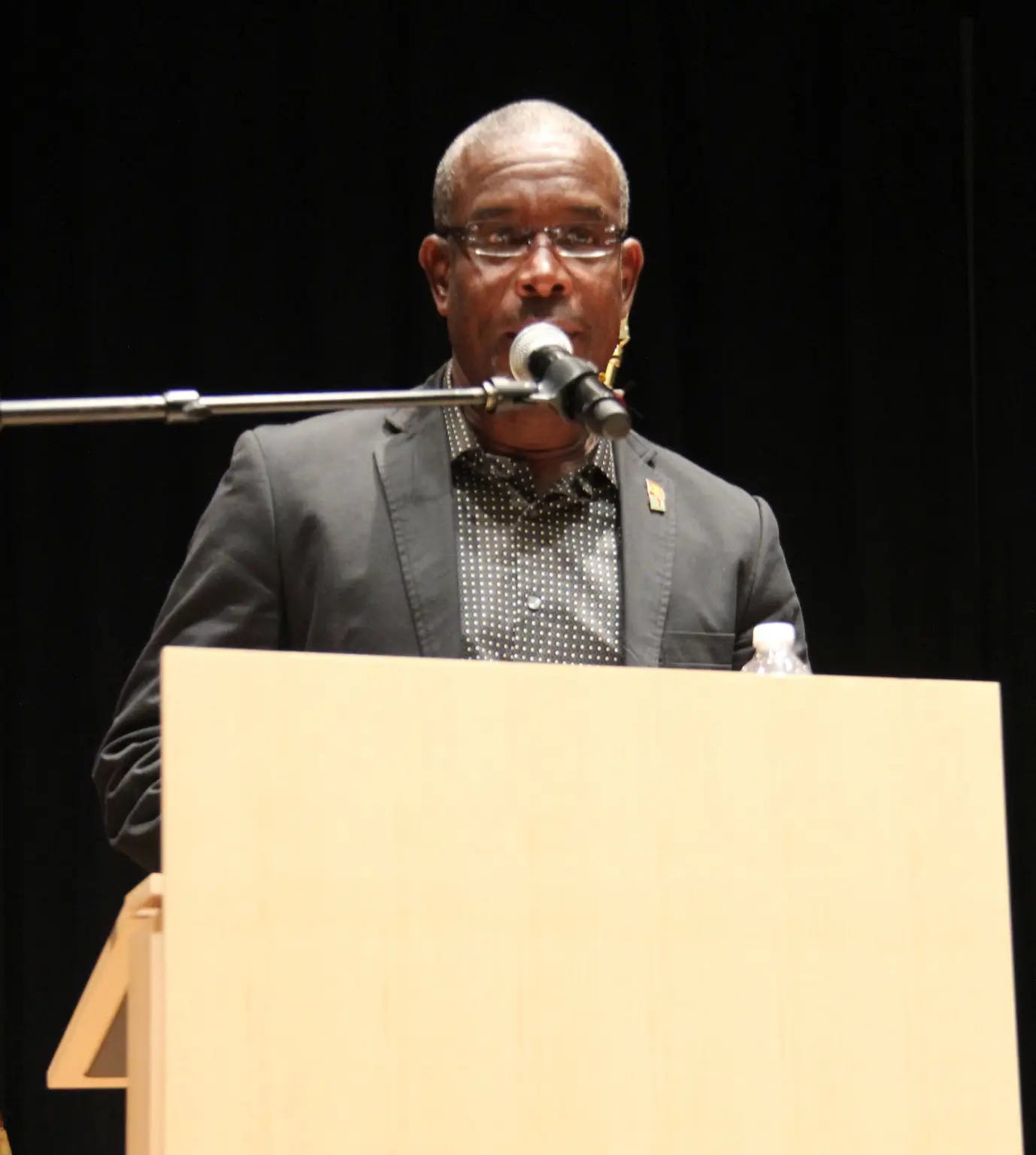More foreign affairs in a crazy, mixed-up world
CARICOM bracing for sudden return of thousands of deportees, but balks at others
In its first month, the U.S. government’s ramped-up mass deportation of undocumented immigrants has already had its ups and downs, with precise figures hard to come by—probably between 5,000 and 10,000 people deported, most of them to Mexico. But leaders of Caribbean Community nations—meeting this week in Barbados—are preparing for their own upsurge in the near future, with some 15,000 deportees expected to arrive soon.
According to a February report in Caribbean Life, “Jamaica tops the list of CARICOM nations with 5,120 awaiting flights, followed by Guyana with 1,236, Trinidad with 1,197, Belize with 899, and The Bahamas with 709.” The numbers may not seem significant, but remember the tiny populations of the countries involved—about 6 million for these five countries alone—and the impact assumes a different character. [See “Caricom leaders to discuss deportations,” https://www.caribbeanlife.com/caricom-leaders-to-discuss-deportations/ ].
Take Jamaica as one example. Widely touted for decades as a tourist paradise, it has a darker side of violent crime, including the second highest murder rate in the world—57 violent deaths per 100,000 population, second only to El Salvador—according to Prisoners Abroad, a nonprofit organization which follows the issue. In a nation of 2.84 million, that translates to more than 1,500 new murders each year; if just one-third of those result in arrests, that is another 500 criminals added to nearly 4,000 already in jail there on all charges.
But its prisons are already badly overcrowded, according to the latest Human Rights Report by the U.S. Department of State: “Conditions in prisons and detention facilities were harsh and life threatening due to gross overcrowding, physical abuse, limited food, poor sanitary conditions, inadequate medical care, and poor administration.” [See https://www.state.gov/reports/2023-country-reports-on-human-rights-practices/jamaica/.]
The prospect of adding 5,120 returnees—some of them undoubtedly veterans of American prisons—to Jamaica’s population at one fell swoop is troubling indeed. Prime Minister Andrew Holness, seeking an uphill battle for reelection later this spring, minced no words: “those with good intentions will be welcomed with open arms. At the same time, those with deviant tendencies had better fall in line as the country would be intolerant to them.”
Jamaican Prime Minister Andrew Holness. Public domain photo
Holness warned those coming back to Jamaica involuntarily to “come back with a clean heart and a good mind … but don’t come here to undermine and destroy what we have built. Let me be clear to you that this is not the Jamaica that you left 10 or 20 years ago. It is not the Jamaica Constabulary Force that you left 10 or 20 years ago. You will either meet a judge or your maker if you come back to Jamaica and violate our laws and create havoc.”
The effects of so many returnees on the beleaguered economies throughout the Caribbean in such a short period differ from country to country. Trinidad’s 1.4 million citizens, for instance, are currently living under a state of emergency related to the country’s high crime rate among street gangs. Half the size of Jamaica, it already houses almost as many prisoners—more than 3,800 in 2021—as its larger neighbor in equally overcrowded facilities, where pretrial detention often lasts for years.
Jails in Guyana, with just 800,000 citizens, held around 2,300 prisoners behind bars in 2024, according to a report by nonprofit Prison Studies.org [see https://www.prisonstudies.org/country/guyana]. According to the same source, jails in The Bahamas (population 400,000) held some 1,900 prisoners in 2021, compared to about 1,300 in Belize (population 400,000) in 2024.
Deportees face an uncertain future in all of the countries, plagued by high unemployment and offering limited resources to help ex-convicts adjust to life outside prison walls in a country many left decades ago. As in the United States, recidivism is at least a strong possibility for many.
Prime Minister Ralph Gonsalves of St. Vincent and the Grenadines (population 101,000, with 304 prisoners in 2024) suggested a helpful strategy for the U.S. government: at least give us an annotated list so we know more about how to deal with them before they come back.
Prime Minister Ralph Golsalves of St. Vincent and the Grenadines. Public domain photo
“You may deport somebody, let’s say somebody who is in jail for burglary. They finish their sentence, or even if you commute their sentence for deportation, you send them home. All the information we have is that John Brown was serving five years for burglary, armed robbery, or whatever it is. However, we do not know the history of this person, how long that person was in the United States of America, his or her skills, educational attainment, what is his or her criminal record. We have not received anything formal about that,” Gonsalves told Caribbean Life.
Common sense, undoubtedly, but what extra documentation the United States plans to offer for the deportees is unclear.
* * * * * * *
Deportations from the United States are nothing new for Jamaica. Earlier in February, a group of 56 deportees—prisoners who had completed their terms, including four convicted murderers who had completed their terms—landed in Kingston as part of a “regular, routine monthly repatriation,” according to Jamaican Foreign Minister Kamina Johnson Smith, who said preparations are being made in earnest for any large group of arrivals in the coming weeks.
When I served in Kingston as a U.S. consular officer in the early 1980s, during an economic downswing there, thousands of applicants for tourist visas—up to 90 percent of those standing in our daily visa lines—were routinely denied on grounds of poor economic ties to the island. Deemed under Section 214(b) to be “intending immigrants,” many applicants already had relatives living in the United States—and too often, job offers waiting for hard-working English speakers once they got off the plane. (A minority even offered us cleverly-forged Jamaican bank account and employment papers to exaggerate their income and ties.) Meanwhile, we were also receiving dozens of notices per month from U.S. lawyers, representing those Jamaicans overstaying 3- or 6-month visits on tourist visas, seeking to adjust status in the States, in order to live there and work legally.
It was not easy to say “no” to thousands of pleasant people in our lines—polite, literate, with no criminal records—but we had little choice if we wanted to stem the tide of illegal immigration. Jamaicans love to travel—more Jamaican-born citizens live outside the country than inside it. For sure, most of those Jamaicans who immigrated—either legally, under petitions from their U.S. relatives, or less so by adjusting status—did prove to be good citizens once they got there. But not all succeeded; witness the 50-a-month prisoner repatriations of recent years, or the 5,000 potential deportees waiting to be sent home now.
“While new immigration enforcement measures will result in an increased number of Jamaicans being repatriated, there are several processes involved. The government of Jamaica is actively monitoring the situation and will continue our historically close engagement with US authorities. We also wish to make clear that Jamaica, like most, if not all, countries, has international obligations requiring us to accept the return of our citizens who are subject to deportation,” Johnson Smith added.
At least Jamaica’s government is aware of the problem, and making an effort. The situation in nearby Haiti—population 11 million, with 7,500 of them in jail, lacking a fully-functioning government, racked by street gang violence, yet facing the likely prospect of a far larger number of deportees—is far more troubling. According to Caribbean Life, an astounding 32,363 Haitians are already on the list for immediate deportation, once “located, apprehended, brought before a court, and detained until repatriation.” [See commentary by Sir Ronald Sanders, “Caricom Nations Should Respond Together,” https://caribbeannewsglobal.com/caricom-nations-should-respond-together-to-new-us-policies/ .]
More alarmingly, more than 500,000 Haitian migrants now in the United States will lose their Temporary Protected Status (TPS) in August, according to the latest announcement from the new Trump administration.
But where will they go? One option may be to house some of the Haitian deportees in offshore U.S. facilities at Guantanamo Bay, Cuba, until recently the site of a military prison for terrorists associated with attacks on the World Trade Center in 2001. A decade before 9/11, U.S. officials previously used other land on the large base as temporary outdoor “tent cities” to house more than 10,000 Haitian would-be migrants in the early 1990s, before eventually returning them all to Haiti. That was, of course, back when Haiti actually governed itself, however sporadically, between coups. [See the PBS Frontline report, “Flashback: The Little-Known History of Guantanamo Bay,” at https://www.pbs.org/wgbh/frontline/article/trump-migrant-detention-guantanamo-bay-flashback-history/ .]
The Trump administration has floated the notion of housing up to 30,000 Haitian deportees in 2025 at Guantanamo Bay, where it recently held hundreds of Venezuelan deportees briefly, before Venezuela took them back. The Trump administration has also explored the possibility of using agreeable third countries as stopovers for non-national deportees—most notably El Salvador, whose leader informally offered to accept any and all prisoners, in return for pay—and Panama, which has agreed to accept hundreds of Asian deportees from the United States.
But not all countries are quite as eager as either El Salvador or Panama. Colombia, for instance, balked initially at allowing U.S. military planeloads of Colombian deportees to land, before backing down in the face of threatened U.S. tariffs. The tiny tourist haven of Grenada, population 117,000 (with 385 prisoners in its jails in 2024), is perfectly willing to take back its own deportees, like Jamaica, but for now, no one else’s.
Joseph Andall, Grenada’s Foreign Minister, politely shot down rumors that Grenada had agreed to house third-country deportees. The United States had asked Grenada to consider it in January, he explained, but Grenada was “not in a position” to agree.
“There was a request for us to host nationals of third countries who may be deported. Unfortunately, we are not in a position to do that and we have communicated that to the U.S. authorities. We did get communication from them towards the end of January that they will probably be repatriating or deporting Grenadian citizens. They also spoke about the consequences of countries not wanting to receive their nationals,” he said in Barbados.
Joseph Andall, Foreign Minister of Grenada. Public domain photo
Grenada always willingly accepts its own deportees, he added—even if some of them may prove problematic. “There may be some with particular backgrounds to whom we may have to give particular attention. However, we have every intention of accepting bona fide Grenadians who are repatriated from whatever country. Deportation and repatriation are nothing new.”
[See “Grenada firmly rejects return of deported non-nationals,” https://www.caribbeanlife.com/emphatic-no-from-grenada-for-deported-non-nationals/?utm_source=sailthru&utm_medium=email&utm_campaign=caribbeanlife-m&utm_term=Caribbean%20Life%20Daily%20Newsletter .]
Note: The terms used here are related, but not interchangeable. According to the U.S. Department of Homeland Security in 2024, the term “repatriation” covers a broad range of groups: “When we send an alien back to their country of citizenship or a third country, it's called repatriation. It can be a removal (which carries administrative penalties), a return (which does not carry administrative penalties), or an expulsion based on Title 42, which was enacted during COVID-19.”
The narrower term “deportation,” as normally used, generally involves an involuntary expulsion—and most often refers to prisoners who have completed their prison terms. According to a recent report in USA Today, “Deportation is the formal removal of a foreign national from the U.S. for violating an immigration law, such as committing a criminal act or threatening the public safety of others.”
Next time: More foreign affairs in a crazy, mixed-up world






